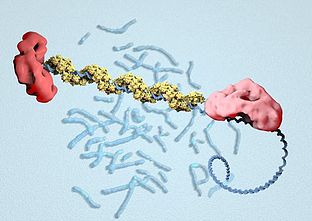Know Your Family History

(Photo : Imperial College London) BRCA2 (red) helps RAD51 (yellow) form short filaments on strands of broken DNA (blue), enabling it to look for matching strands of DNA and repair the break.
Sources:
https://www.nlm.nih.gov/medlineplus/magazine/issues/fall06/articles/fall06pg23.html
"I have a Family History of Breast Cancer on both sides of my family so it was important for me to get genetic testing in order to make informed decisions about my breast health care" Tallulah Anderson, Founder 2for2 Boobs
The Sister Study brought to the forfront in the African American Community the importance of knowing your family history. The purpose of the Sister Study is to learn how the environment and genes may interact to affect the chances of getting breast cancer. Actress Angelina Jolie's breast health decisions were made due to her genetic testing as well. These mutations cause about five percent of all breast cancer cases, 15 percent of all ovarian cancer cases, and between 20 and 25 percent of all hereditary cases of breast cancer.
Ms. Jolie has the BRCA 1 mutation and lost her aunt, grandmother, and mother to cancer. If you have the BRACA 1 mutation you have an 87 percent risk of breast cancer and a 50 percent risk of ovarian cancer. Jolie made the decision to have a double mastectomy and her ovaries removed. In an Opinion Editorial in The New York Times in March 2005 she wrote
"I did not do this solely because I carry a BRCA1 gene mutation, and I want other women to hear this. A positive BRCA does not mean a leap to surgery. I have spoken to many doctors, surgeons and naturopaths.. . .There is more than one way to deal with any health issue.
Who exactly should be tested for BRCA 1 and 2 mutations?
Your Family History with Breast Cancer should be the driving force for your decision to be tested. The purpose of genetic testing is to identify those women and men who are at increased risk of breast, ovarian and other cancers based on there family history, so that steps to reduce or eliminate that risk can be taken.
Everyone (both men and women) has the BRCA 1 and BRCA 2 genes. They produce proteins that suppress tumors and ensure the stability of the cell's genetic material while repairing andy DNA that has been damaged. It becomes a problem when these genes are mutated, preventing them from doing what they were intended to do.
The BRCA mutation test is a simple blood test. Those who take the test undergo a pre-genetic counseling to assist in understanding the test and the possible results.


This brief 1-minute questionnaire https://www.
It will help you determine whether you should be further evaluated for Hereditary Breast Cancer or other hereditary cancers.
Did You Know:
- Genetic testing can help you determine if you are at increased risk for developing certain types of cancer.
- 28 Genes are analyzed by Myriad Genetic Laboratories for hereditary cancer risk.
- Coverage is excellent! Most insurance companies cover genetic testing at 100%. #take2minutes2checkyour2 #2for2boobs
